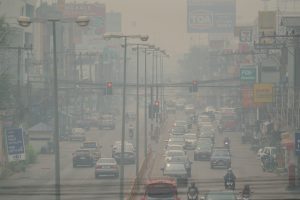Thailand’s Chiang Mai now has airborne pollutants that are 20 times higher than the World Health Organization (WHO) standard. Last week, Thai Prime Minister Srettha Thavisin declined to designate the northern city as a disaster area in order to protect the country’s tourism sector. In an announcement on X (formerly Twitter), Srettha expressed worries that the announcement would “affect the number of foreign tourists when tourism has just recovered in the wake of COVID-19.” Some questioned the optics of the decision, suggesting that the Thai government instead focus more on the health and quality of life of its residents. A declaration of a disaster zone would have entitled the province to emergency funds for mitigation purposes.
Srettha’s decision is crudely pragmatic and arguably shortsighted. What is more beneficial to Chiang Mai, and the north of Thailand as a whole, is the acceleration of sustainable solutions to a problem that transcends provincial and national borders and has a long-term effect on the health the Thai public, as well as impacting Thailand’s reputation as a premier tourist destination.
The scourge of PM2.5 pollution, or harmful particulate matter that measure 2.5 microns or less in diameter, is much more widespread than in just Chiang Mai alone, and will not be solved without a combined whole-of-government and private sector solution. First, the particulate matter comes from a number of sources: transportation, energy, agricultural burning, and industrial sources. The result is a dreary and toxic haze that is dispersed from its origin to neighboring areas.
While the origins and contributors are different, the result is the same. Around this time last year, the Department of Disease Control and the Department of Health noted that more than 1.4 million people were impacted by air pollution in Bangkok. And while Chiang Mai recently topped the list of the world’s most polluted cities, Bangkok, back in February was ranked ninth.
But in both cities, solutions seem far away and senior leadership on an issue of grave importance is lacking. Bangkok Governor Chadchart Sittipunt campaigned on PM2.5 and promised a number of initiatives, such as growing trees, setting low-emissions and dust-free zones in the city, but the vast majority of these measures are reactive rather than proactive. Srettha’s punting on a disaster declaration is far worse, and simply delays a problem that has no short-term solution in sight.
Worse, the very reason Srettha decided to not declare Chiang Mai a disaster zone, the possible impact on tourism, is failing. Chinese tourists, who are key to Thailand’s economic recovery, are already speaking out on social media. Air quality has become a hot topic among netizens on Xiaohongshu, a Chinese social media platform. A Chinese hashtag “smog season in Chiang Mai” has attracted nearly 50,000 views, according to Thai PBS.
Back in June 2023, the Tourism Council of Chiang Mai pushed for action after the election the month prior, warning that retired senior tourists have vowed to stay away if the smog problem isn’t solved by the government. The problem has been ignored for so long that back in June, 1,700 plaintiffs in northern Thailand filed a lawsuit against the government, including the National Environmental Board, for inaction and violations of their human rights.
In plain terms, the prime minister’s argument is moot, as Chiang Mai has become a magnet for somber international news as a result of its air quality problems, such that some tourists are likely to revisit their travel plans until the air quality problems are mitigated. CNN and other international networks have run segments on the pollution problem over the past few years.
Bigger, bolder solutions are required because national inaction is just as injurious to the health of Thais as it is to tourism. According to the Air Quality Life Index (AQLI), developed by the Energy Policy Institute at the University of Chicago, all of Thailand lives where particulate pollution is higher than the recommended level set by the WHO. Pollution in Thailand has risen almost 23 percent since 2000, but in the north it is as high as 30 percent. As reported by the AQLI in 2020, if there were a 30 percent reduction in PM2.5 concentration, Chiang Mai would add more than 10 months to the average life expectancy.
Broader national solutions to a national air quality crisis could include the vast expansion of carbon markets, an area where not only Thailand but most of Southeast Asia is falling far behind. Srettha could catalyze the development of a more robust voluntary carbon market by working closely with the private sector and public banks. The World Bank, for example, has recommended similar strategies, such as the imposition of higher carbon costs on emissions as well as the introduction of emission-trading schemes. Or the government could take stronger action by imposing carbon taxes on the stronger polluters, which include large agribusiness.
The prime minister’s singular focus on tourism also nearly extinguishes discussion of Thailand’s environmental commitments. The country lags behind neighbors Cambodia and Vietnam in carbon reduction and net-zero targets and there has been little public mention of environmental problems related to PM2.5 that transcend borders, as particulate matter from nearby Laos and Myanmar will still affect Thailand. The Thailand Development Research Institute noted that approximately 60-65 percent of the haze in Chiang Mai comes from neighboring countries. Srettha must enlist their help if the problem is to find a long-lasting solution, even if the Clean Air Act is enacted.
By putting too much energy and concern into the potential loss of tourism in the north, Srettha misses the proverbial forest for the trees. A whole-of-government approach, including foreign policy, is needed to bring an end to the toxic cloud that hangs over Chiang Mai and across the country.

































